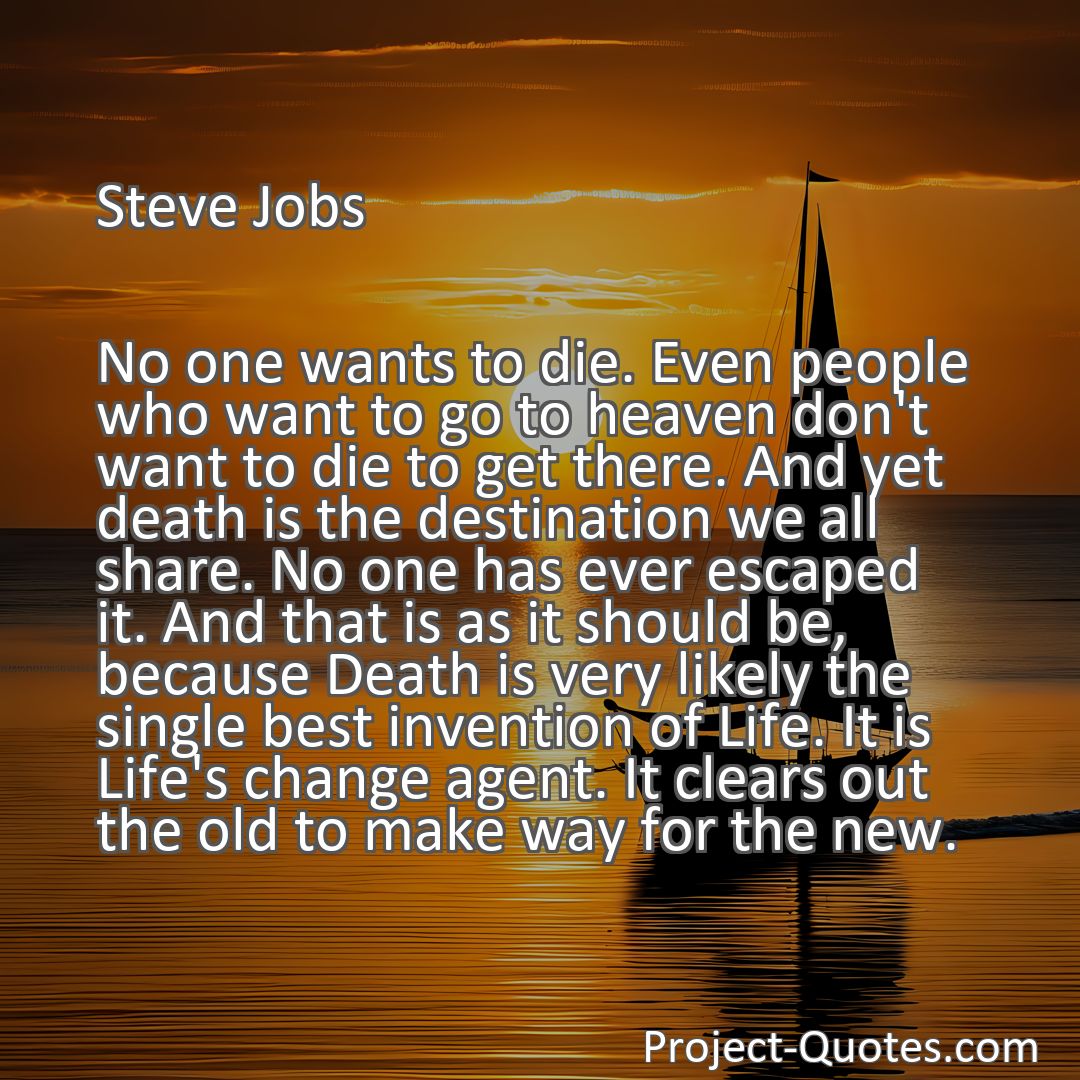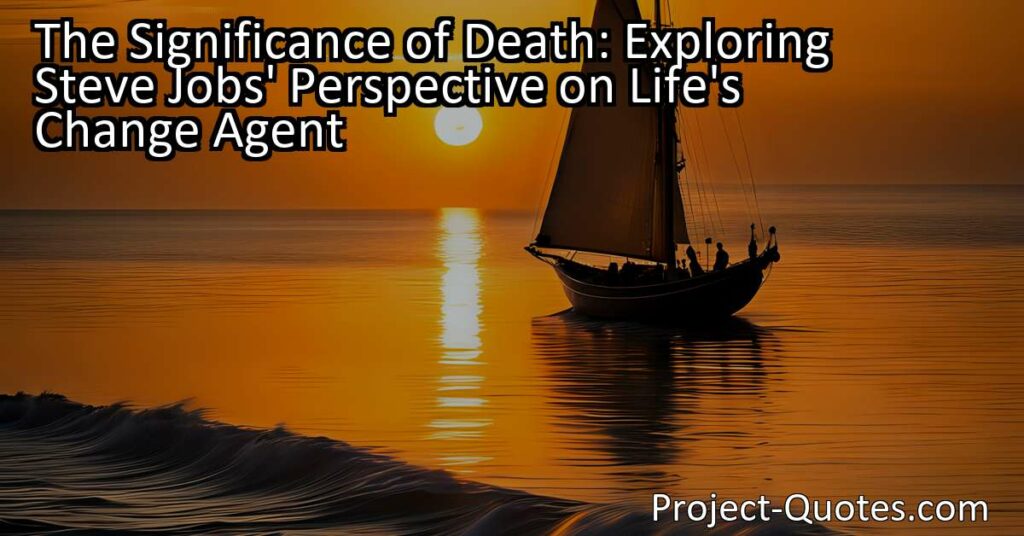Steve Jobs
Understanding the significance of death is important, as it is a concept that often brings about discomfort and mixed emotions. The quote by Steve Jobs explores the deeper meaning behind death and highlights its universal nature. While death is something we all fear and wish to avoid, it is also an inevitable part of life that serves as a catalyst for renewal and transformation. Ultimately, contemplating the role of death can lead to a greater understanding of ourselves and the world around us.
Table of Contents
- 1 No one wants to die. Even people who want to go to heaven don’t want to die to get there. And yet death is the destination we all share. No one has ever escaped it. And that is as it should be, because Death is very likely the single best invention of Life. It is Life’s change agent. It clears out the old to make way for the new.
- 2 Steve Jobs
- 3 Meaning of Quote – No one wants to die. Even people who want to go to heaven don’t want to die to get there. And yet death is the destination we all share. No one has ever escaped it. And that is as it should be, because Death is very likely the single best invention of Life. It is Life’s change agent. It clears out the old to make way for the new.
- 4 Freely Shareable Quote Image
- 5 Related
Death is a topic that often brings about mixed emotions and discomfort in many individuals. It is a concept that many people have trouble accepting or understanding fully. However, when we take a closer look at the quote, “No one wants to die. Even people who want to go to heaven don’t want to die to get there,” by the late Steve Jobs, we can begin to explore the deeper meaning behind death and its significance in our lives.
Firstly, the quote highlights the universal truth that no one desires death. Regardless of our personal beliefs or aspirations, the idea of death tends to evoke fear and apprehension within us. Steve Jobs emphasizes this by noting that even those who strive for a heavenly afterlife do not wish to experience the process of dying, suggesting that the fear of death is deeply ingrained in human nature.
However, the quote also presents an interesting perspective on death, stating, “And yet death is the destination we all share. No one has ever escaped it.” These words remind us that death is an inevitable part of life. No matter who we are, where we come from, or what we believe in, death is something that every one of us will eventually face. It is a destination we cannot avoid or escape, which is a somber but crucial truth to acknowledge.
Despite its inevitability, the quote continues by asserting that death is “the single best invention of Life.” At first glance, this notion might seem perplexing or even unsettling. How can death, something associated with loss and sorrow, be considered the best invention of life? To comprehend this concept, we must delve deeper into the underlying philosophy behind these words.
Steve Jobs explains that death is “Life’s change agent.” In this context, death symbolizes the cycle of renewal and transformation. It is through death that the old can be cleared out, making space for the new. Just as the changing seasons allow for new growth and revitalization in nature, death serves a similar purpose in our lives. It brings closure to one chapter, making way for fresh beginnings.
Imagine a garden filled with withered flowers and overgrown weeds. Without removing the old and withered plants, the garden cannot thrive and flourish. In the same way, death serves as the agent that clears out the old, be it physical bodies or outdated ideologies, making way for new ideas, new opportunities, and new life.
Consider the social, technological, and cultural advancements that humanity has witnessed throughout history. They often occur as a result of previous practices, beliefs, or technologies becoming outdated or obsolete. By discarding the old and making space for new ideas, discoveries, and innovations, death acts as a catalyst for progress and evolution within society.
Furthermore, death reminds us of the impermanence of life and encourages us to cherish the time we have. When we acknowledge our mortality and the fleeting nature of life, it can serve as a powerful motivator to make the most of every precious moment we are given. The awareness of our limited time can push us to pursue our dreams, strengthen our relationships, and seek joy and fulfillment in our daily lives.
Additionally, death can provide a sense of perspective and help us prioritize what truly matters to us. It pushes us to reflect on our values, desires, and aspirations, encouraging us to live authentically and align our actions with our deepest convictions. When we understand that our time is limited, we are more likely to invest ourselves in the pursuits that bring us joy, meaning, and a sense of fulfillment.
In a broader sense, death also serves as a reminder of the interconnectedness of all life. Regardless of our individual experiences and circumstances, death is something that unites us all. This shared destiny can foster empathy, compassion, and a greater appreciation for the diversity and beauty of the human experience. It reminds us to cherish the moments we have with loved ones and to treat others with kindness and understanding.
In conclusion, Steve Jobs’ quote offers a unique perspective on death and its significance in our lives. It acknowledges our natural aversion to death while recognizing its inevitability. Death acts as Life’s change agent, clearing out the old to make way for the new and encouraging growth, progress, and transformation. It reminds us of the impermanence of life, pushing us to make the most of our limited time, prioritize what truly matters, and foster empathy for our fellow human beings. While death may be a difficult topic to discuss or grapple with, contemplating its role in our lives can lead to a deeper understanding of ourselves and the world around us.
I hope this quote inspired image brings you hope and peace. Share it with someone who needs it today!


